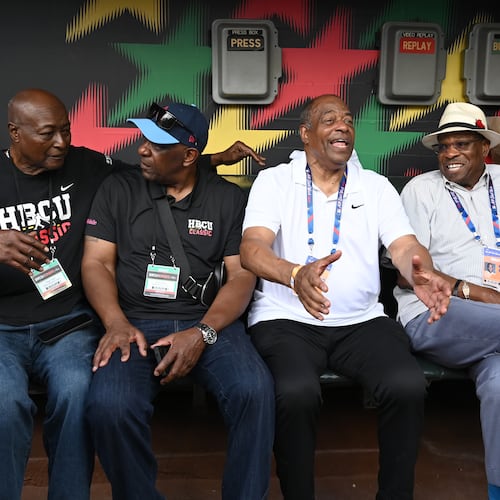OAKLAND, Calif. — On Tuesday night, AJ Smith-Shawver, who arrived at the ballpark earlier in the evening, answered a question about whether he believed he could make it to the major leagues this season.
Of course, he said, his best-case scenario had him thinking about the big leagues.
But even then, he added, he couldn’t have planned it out like this.
“It’s great to see that they’re just going to give young guys like me opportunities,” he said, “and I’m just kind of grateful for the opportunity.”
The Braves have taken an unconventional path in player development. They’ve shown they don’t have any rigid philosophies on the amount of time prospects must spend at each level.
If a player proves himself, he will be rewarded.
And if he can help the big-league team win, he’ll be called up.
Minor leaguers notice this. It motivates them.
“It allows you to kind of actually work toward something in your first year in the minors, rather than it just being a really, really long process of, ‘OK, I’m gonna spend a year here, a year here,’” Bryce Elder said. “No, they understand that if you can help us up here, then you’re gonna be up here. I know for me, I got moved quick. Not as quick as AJ and not as quick as Strider. I think it’s a really cool thing, just because you’re moving, you’re continuing to where you want to end up.”
Before the Braves called him up, Smith-Shawver had pitched only 110 innings in the minors.
Before Spencer Strider’s debut, he had logged only 94 minor-league innings.
Michael Harris II played only 197 games after high school before the Braves felt he could help them win.
In his first full professional season in 2021, Elder tossed 137-2/3 innings over three levels before his debut early in the 2022 season.
“I think they have us prepared in understanding that you can move quick,” Elder said. “I think it’s because they’ve done it in the past, and so younger guys know, ‘If I throw well, I’m gonna move up.’”
Three random examples for context:
Before debuting versus the Braves, Dodgers starter Bobby Miller had 183 minor-league innings under his belt – more than the three Braves pitchers mentioned in this story.
The Cardinals’ Jordan Walker – a Decatur High alum – played 201 games in the minors before making the team’s opening-day roster this year. (The Cardinals have since sent him down to Triple-A.)
Julio Rodriguez, the American League Rookie of the Year last season, played 217 minor-league games before debuting.
There have been cases of players moving quickly through their respective systems. The Braves, however, have been more aggressive than most other clubs.
The Braves’ player development department – and everyone in it – deserves a lot of credit.
“They’re a big part of it,” Braves manager Brian Snitker said Tuesday. “I’ve always said the scouting and player development, man, they do a great job. And they’re a big part when they get these guys, and indoctrinating them to professional baseball and the way we do things.”
Harris, the reigning National League Rookie of the Year, entered Wednesday’s series finale batting .179 with a .534 OPS. At the plate, he’s underperforming by a lot.
In the field?
He’s been terrific. He made an incredible catch to rob a home run in Sunday’s win over Philadelphia. He also has three outfield assists this season.
It’s a positive that Harris hasn’t taken his offensive struggles out to center field.
“He hasn’t, and that’s why you kind of weather the storms with him,” Snitker said before Tuesday’s contest. “And I saw, he’s still barely over 100 plate appearances right now. Scorched a ball (Monday) night. So I’m seeing glimpses of that. But he’s a weapon and can help win you games. … You just hang with guys like that and keep working with them, keep them in there, and eventually he’s going to figure all this out.”
Pillar’s frequent homers
After his home run Tuesday, Kevin Pillar is homering once every 14 at-bats, the highest rate of his career.
In 2019, Pillar hit a career-high 21 homers. But he homered only once every 29.10 at-bats that season.
Only two Braves have homered more frequently than Pillar this season: Matt Olson (12.12 at-bats per homer) and Marcell Ozuna (13.27 at-bats per homer).
Braves’ starting pitchers for the Arizona series
The Braves are off on Thursday. On Friday, they begin a three-game series with the Diamondbacks.
Charlie Morton will start the series opener. Spencer Strider will pitch Saturday.
Michael Soroka will make his second start Sunday.
About the Author
Keep Reading
The Latest
Featured



